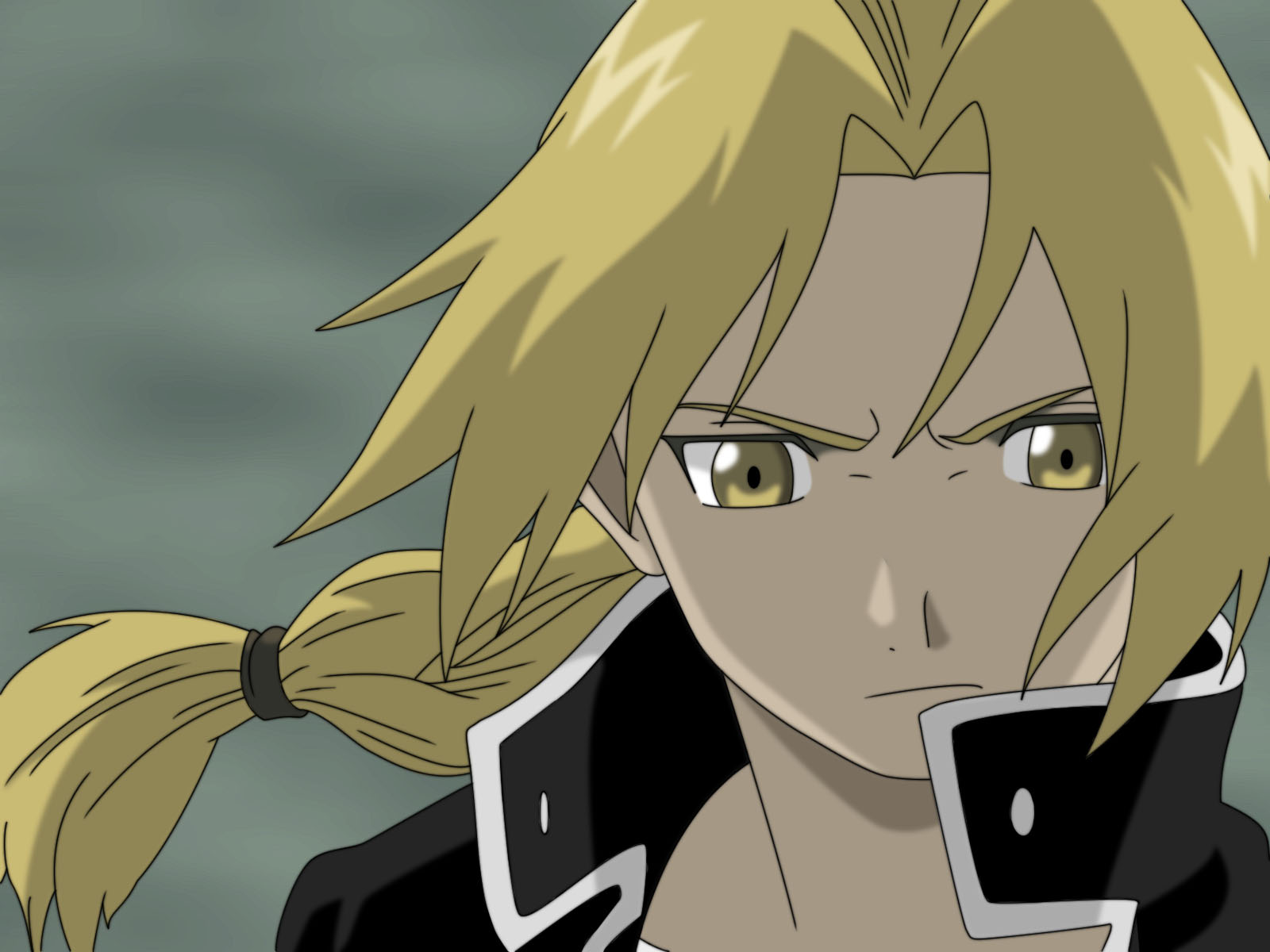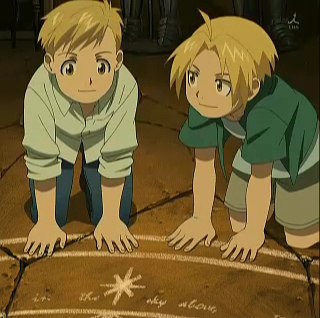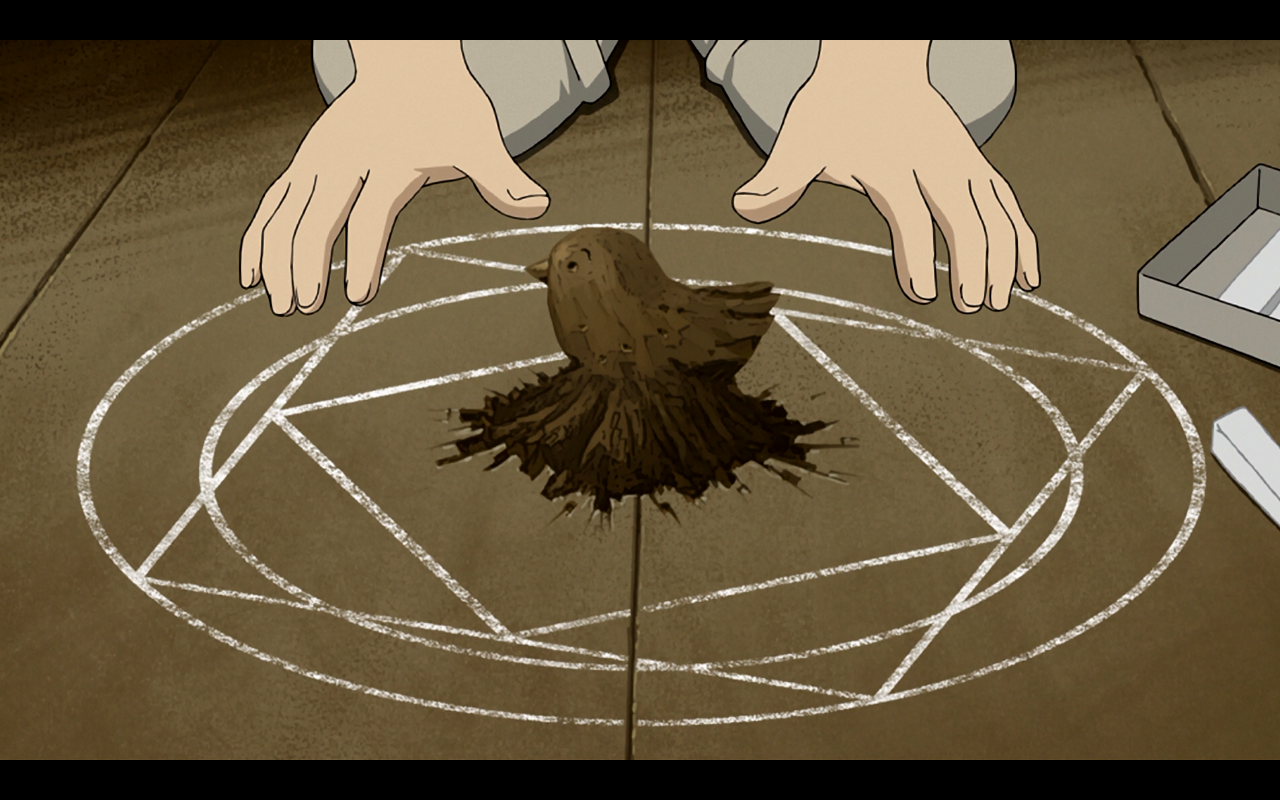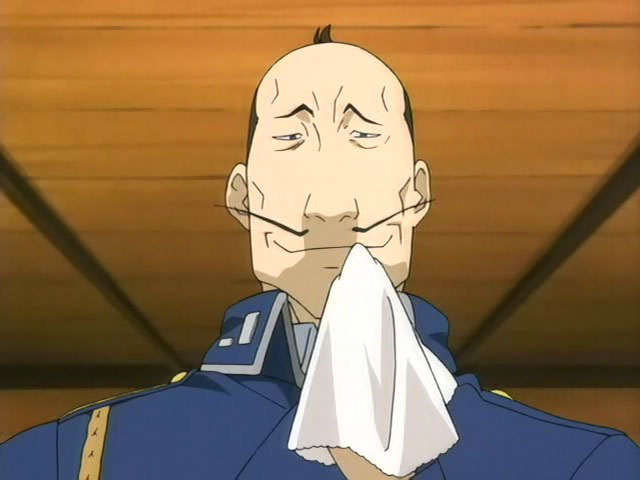At Jugs's urging, I've finally gotten around to watching the 2009 version of the Fullmetal Alchemist anime, known in English as Fullmetal Alchemist: Brotherhood. I'm pretty sure no one will be surprised to hear that I found it to be far superior to the first crack at animating the series, from 2003. Though that's not to say I didn't enjoy that version; I loved it. Some of the episodes are actually paced better than their 2009 counterparts, the atmosphere is appropriately dark, and I thought it was incredibly clever what they did with the Homunculi (ie that they were – highlight for 2003 spoilers – the results of attempted resurrections, e.g. Tricia became Sloth and Izumi Curtis's son became Pride). It's only that the new one surpasses even those lofty standards. But both are great, featuring a rich setting, an interesting story, and characters who are varying degrees of stylish, sympathetic, impressive, and fascinating.
Of course, the new version does benefit from contemporary technology. The fluid animation and colourful visuals make the action scenes engaging, whether the combatants are duelling with swords, guns, or alchemy, and, thanks to skillful camera work, we always have a good idea of their surroundings and positions relative to each other. The setting and certain story elements reminded me of Chrno Crusade, so I gave an episode of that a watch, and boooooy had I forgotten how bad the action was in that show. The typical formula there is to flash a close-up shot of a good guy firing their weapon, then cut to the bullets rebounding off the monster of the week. It's completely bland and devoid of tension. Gun battles in Hagaren do this sometimes too, but in Hagaren we always know where everybody is, people die frequently and in dramatic fashion, and attacks feel more destructive, making the proceedings seem dangerous and chaotic.
All of that action, however, is not to no purpose. The Matrix has a brilliant synergy between thought and action, and, standing amongst brainless thrillers, was the first work to show me that the Action genre could be smart, if it wanted to. Hagaren was quite possibly the second. Since I'm theoretically a Philosophy Major, I'm inclined to look at everything I see in terms of that academic background, much as a physicist will look at everything in terms of certain scientific principles, or a skateboarder will see the world in terms of obstacles and “spots.” This series provides plenty of philosophical material.
Don't get me wrong, Hagaren isn't nearly the most philosophically weighty series I've ever consumed, and you'll typically get laughed out of the thread if you bring it up in any “philosophical anime” discussion. But if you're interested in looking a little deeper at some of the stuff that's raised, here is a brief analysis of what I have identified as the three main themes. There are others, of course, like humanity, community, the cost of ambition, and the meaning of family, but I believe these three to be the most major.
Obviously, this post will contain spoilers.
Tertiary theme: Faith
If anything, Arakawa, or at least this work, seems to take a dim view of religion, especially Renaissance-era Christianity. The only major institution we see is the Cult of Leto, which the Elric Brothers quickly expose as a sham, a play by one power-hungry priest to gain deeper loyalty and deeper coffers. What's interesting to me is that this is one of the few cases where a fictional atheist actually has some intellectual elbow room. In this setting, as in the real world, the existence or non-existence of God is still very much up for debate. This is in stark contrast, to, say, Final Fantasy X, in which the necessity of sending recently departed souls to the afterlife via particular rites is an observable fact. Believing otherwise would be willful ignorance. This is what TV Tropes calls a “Flat Earth Atheist,” someone like Kaiba Seto, who stubbornly refuses to believe in magic despite regularly seeing it performed in front of him. But in the world of Hagaren, Ed's atheism is entirely justified.
What's stranger is what happens when Homunculus actually comes face-to-face with the being who claims to be God, ruler of the heavens and the earth, after hundreds of years of vying to gain His favour. Rather than praising his loyalty and ambition, the mighty spirit actually chastises him for blindly relying on a higher power, rather than looking towards himself for motivation and agency. The message here seems to be to pull yourself up by your own bootstraps, rather than holding out for a saviour. This is reflected in the main action of the story, as the brothers make all their major advances through hard work, intelligence, talent, smart timing, and, quite often, hours spent poring over dozens of books and documents. They do occasionally get a little help from their friends, but remember that they only gained those relationships from actively working to expand their network of contacts. And sometimes they hit a stroke of luck, but those only come about from consistently pursuing as many angles as possible, in the hopes that at least one of them will work out.
That said, I'm not completely sure what to make of “God,” the grinning white imp who sits in front of the Door of Truth and purveys knowledge but applies a personalized punishment for having wanted it. We have no real way of confirming whether this really is God or just some lesser spirit making claims of grandeur, or if God even exists in this universe, but let's take Him at his word and assume for a moment that He really is “the” God. In his own words: “I am what you call 'the World,' or 'God,' or 'the Truth,' or 'All,' or 'One.'” Those last two (全と一、zen to ichi) echo the arc in which Edward and Alphonse, as children studying under their teacher Izumi Curtis, come to understand the laws of the natural world, and thus alchemy. The entire universe, it turns out, is made up of an unbroken “flow,” so that all is one, which is why the circle is the basis of all transmutations; this is later confirmed by Mei Shan, who says that Xing's version of alchemy draws from a power source that they imagine as a river flowing to the tops of the mountains, through the air and back into the earth.
This “zen to ichi” concept closely resembles Tillich's conception of God. In his view, trying to imagine God as a being – even if He is the greatest, most glorious of all beings in existence – is the wrong way of trying to understand Him. He is not a particular force, acting in a particular way, in a particular series of places, at a particular time (God is timeless, not in the sense of temporal infinity but in that He is outside of time entirely). Rather, God is everywhere, manifested in everything, constantly, because He is not particular but universal. Conceiving of him as merely our unknowable Father in Heaven is akin to putting a hard barrier between you two, which makes no sense as he is “closer to you than you are to yourself.” He is not a “being among beings” but the “Ground of All Beings.” You see this way of thinking every time somebody equates God with “the Universe” or a similar concept.
Sin is another topic that comes up periodically, and one which is, naturally, rather religious in nature, as without a higher arbiter of some sort or another there can be immorality (arguably), but not sin as such. The main sin we see humans committing is hubris, saliently in thinking that they can defy the laws of nature and create life. Edward explicitly refers to their resurrection attempt as a “sin” several times. In return for trying to gain this knowledge, alchemists have something taken from them, which can only be reclaimed if they manage to find something else to pay for it; Hohenheim tells Izumi he cannot restore her lost organs specifically because her having lost them was a mark of her punishment from God. We eventually learn that He takes whatever seems the most suitable for their arrogance: Edward, with his unswerving principles, lost the ability to stand upright; Izumi, who wanted her dead son back, lost the ability to ever have another; Roy Mustang, with his eyes on the Fuhrer's chair and the future of Amestris, lost his sight. (Notably, while Edward does recover his fleshy arm, which he paid in order to affix Alphonse's soul to a suit of armour, he never does get back his leg, which was the original toll incurred for attempting the resurrection.) Everyone who makes this mistake seems to take the lesson to heart, warning others against following the same path, and Edward even says that he and Alphonse will never again try to resurrect their mother, and are only on a quest to regain what they lost in the attempt.
Totally unrelated note, this reminds me of the movie Serenity (the conclusion to the TV show Firefly), where there's an assassin going around murdering people, as assassins are wont to do, I guess, and he must be a Godfearing kind of a guy because right before he murders someone, he always asks them, “Do you know what your sin is?” and then, since it would be a bit of a dick move to ask a question like that and then leave them hanging, he tells them. Except when he asks Mal, Mal says “Ah, hell, I'm a fan of all seven. But right now...I'm gonna have to go with Wrath,” and kicks his ass.
What's your sin? I'm, yeah, pretty sure mine is Lust.
Secondary theme: Equivalent exchange
I think Alphonse summed up the concept beautifully in the OP of the 2003 version of the anime. I can still recite it from memory four years after watching:
人は何も犠牲無しに何も得る事は出来ない。
何かを得る為には、同等の代価が必要になる。
これが錬金術における「等価交換」の原則だ。
その頃僕らは、それが世界の真実だと信じていた。
Humankind cannot gain anything without first giving something in return.
To obtain, something of equal value must be lost.
This is alchemy's first law, of “equivalent exchange.”
In those days, we really believed this to be the world's one, and only, truth.
Amazing. I heard those words on YTV late one night and I was hooked. Those four lines tell us everything we need to know about the show's direction and what we're about to watch. That goes double for the 2003 version, which downplays the next theme I'm going to discuss in favour of this one.
This principle, of course, is clearly meted out through the events of Hagaren. Alchemists cannot create things, they can only transform. Edward is able to make Lin a sword from a giant pool of blood by drawing together a bunch of iron. When he repairs Alphonse's armour, the metal becomes a little bit thinner each time. The very reason Kimblee is so dangerous and feared is that he can create a bomb from whatever substances he has around. When alchemists transmute part of the ground or a wall, a depression appears in the surface near whatever they shaped, showing that the matter was drawn into it. And the primary drama of the 2003 series is trying to figure out the nature of a human soul (the answer is much clearer in the new one), since the necessary materials to manufacture a human body can be purchased “on a child's allowance,” but even with all of them present and in their proper amounts, something is still missing.
One more example to hammer this home. In an early episode, glossed over in the 2009 version, the brothers travel to Youswell, a coal-mining town, as inspectors. Like as mystery shoppers, or the entire plot of that one stage play. The townspeople are distrustful of Edward as a “Dog of the Military,” despite the fact that State Alchemists are sworn to serve the public trust, protect the innocent, and uphold the law. The brothers quickly discover that the military guy running the town, Yoki, is a far harsher regent than HQ imagines. Edward convinces Yoki to sell him the town for a massive sum of gold, but since transmuting gold is a felony, they agree to officially have him sign the deed over for nothing. Yoki is well pleased but the next morning realises he's been had, as the gold has returned to its original worthless state. He demands that Edward pay him, only to be reminded that he gave the town away for free.
Edward then mischievously waves the deed in front of the townspeople, telling them that he's going to extract a heavy fee for their freedom. His price? A night's room and board at the local inn, that is, practically nothing. Everyone is stunned but quickly moved to rejoicing at his heroism. Ed might as well have handed the deed directly over to them for free, considering what he charged for it, but he states that by not doing so, he is satisfying the law of equivalent exchange. Perhaps he believes that had he not at least asked for something, a price would have ended up being extracted by some other subtle means, and been far higher. Either way, this is an early demonstration of how important the concept of touka koukan is going to be.
And if you think about it, it makes sense. Alchemy doesn't exist in our world, but equivalent exchange certainly does. If you, like me, are weak in scientific knowledge, do you at least remember doing scientific equations in high school? You started with a set of chemicals, charted its reaction with another set of chemicals, and ended up with something new. Here:
Here's the thing, though. No matter what, you have to end up with all the same stuff you started with. They'll probably be in a different form, maybe with an -ide or an -ate on the end of their names now, but they'll all still be there, and in the same numbers. That's equivalent exchange. Hell, we have this in physics, too. You drop a basketball on the ground, it'll start to bounce lower and lower because it's losing kinetic energy to heat. If you pick it up again and hold it perfectly still, it hasn't lost its energy; it's just that now it's potential energy instead of some other kind. Energy can never be created or destroyed, it can only change form. Same with matter. For every action, there is an equal and opposite reaction.
This even gets back to Part 1 of this analysis, as we see this concept in many world religions as well. If I understand it correctly, you could apply karma to the idea of touka koukan, as karma works off the “garbage in, garbage out” system. And the Biblical “eye for an eye” does seem to call for an equivalent exchange of sorts, if not quite in the way that Hagaren means it, as it suggests that destruction requires equivalent destruction in punishment, whereas Hagaren is saying that creating something requires the destruction of something else.
If that were where it ended, though, it would be an interesting curiosity but not philosophically valuable. But you can apply touka koukan to everything. If I want to buy a sandwich, I have to have the money to exchange for it. To get my hands on that money, I have to possess relevant skills that I am willing to hire out. To improve my Japanese, I must sacrifice a certain number of hours studying. If you want bigger muscles, a prettier face, or better grades, you “have to be willing to put the work in,” as, don't you worry, no shortage of people will leap to remind you. For that matter, if you even want to go three blocks down the road you have to make a choice between either spending a little extra time by walking, or paying in pollution, fuel (which itself is an exchange of fluid for locomotion), and the gradual degradation of rubber from the friction that pulls you forward against the road. Coins for Charon. Soul Shells to get to Battleship Island. If you want through the gate, you have to pay the toll. A day's work for a day's pay.
Of course I'm sure you can come back at me with all kinds of examples of people having things taken from them unjustly, or working endlessly for no discernible gain. And we all know somebody who everybody else hates because they've never had to work for anything (if you don't, it's you) and don't even realise it. In a way, though, doesn't that actually prove that the principle of touka koukan exists? If people get upset when it seems to be violated? And when things seem to cost more than they're worth, or someone receives disproportionate retribution? The world is harsh and unfair, and people regularly lose everything to random accident, but we feel that equivalent exchange should still govern our dealings with each other, if nothing else.
In the next post, I'll explain what I feel to be the most important theme of all.








Fullmetal Alchemist Brotherhood is the first anime series I've watched and completed it recently. Could you recommend another anime series with similar philosophical and critical thought?
ReplyDelete"Death note" and "Monster" that asks what is justice.
DeleteUh, oops. If three years later you still want a response, can I suggest Neon Genesis Evangelion? I even wrote a (spoiler-filled) blog post on its philosophy. Many have said it's actually intellectually empty but that's for you to decide.
DeleteI adore Death Note, of course - it tackles a very different branch of philosophy. A lot of people also like Tengen Toppa Guren Lagan and find it philosophically interesting, although it bored me so I can't exactly recommend it.
And if you want to go beyond anime and manga, I've recently been enjoying The Philosophy of Everything series on the YouTube channel "Wisecrack."